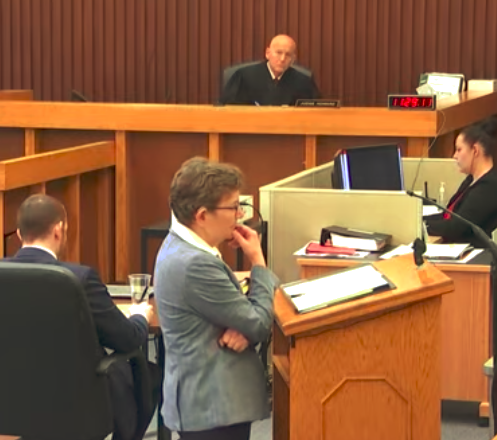By DAMIEN FISHER, InDepthNH.org
DOVER – Is Timothy Verrill the cold-blooded killer who brutally murdered his friend Christine Sullivan and her house guest Jenna Pellegrini while in a paranoid, drug-fueled rage, or is he a pawn in a violent game played by Sullivan’s drug trafficking partner and angry ex-boyfriend Dean Smoronk?
That’s the question now being decided by the jury in the Strafford Superior Court after Verrill’s second trial on charges he killed the women on Jan. 27, 2017 in the remote Farmington house. Verrill’s lawyer, Julia Nye, implored the jurors to consider the sloppy New Hampshire State Police investigation that ignored key facts and players, and resulted in the 2019 mistrial.
“Because the investigation made the premature conclusion that it was Tim, it ignored evidence that didn’t fit,” Nye said.
That includes the fact DNA samples taken from Sullivan’s rings, which broke when she fought off her killer, excluded Verrill. Investigators also ignored the autopsy report which ruled the time of death was Jan. 28, 2017, and not Jan. 27 2017, which fit’s the state’s theory. They also ignore the fact Tim’s fingerprints are nowhere on the tarps used to wrap the bodies after the murder, Nye said.
“There are many rational doubts in this case,” Nye said.
But Assistant Attorney General Peter Hinckley told jurors any facts that don’t support Verrill’s guilt don’t add up to enough doubt to acquit him of the crimes.
“The facts show Tim did it,” Hinckley said.
Verrill was alone with the women on Jan. 27, 2017, hours before the state contends they were killed, Hinckley said, even though the autopsy concluded they died on Jan. 28, 2017. Verrill was seen turning off the surveillance cameras in the house hours before the state said the murders took place. His fingerprints were also found on the garbage bags containing bloody items from the murder.
According to the state’s theory, Verrill was concerned Sullivan and Pellegrini were going to go to police and inform on the drug ring, endangering his freedom and his business. Verrill was also suffering from paranoia due to his own drug use, adding to his obsession over the women and the possibility they would talk to police.
But much of the state’s theory rests on the testimony of Josh Colwell, a former drug dealer and enforcer for the Mountain Men Motorcycle Club. Colwell was working with Smoronk to take over the drug dealing business from Sullivan in the weeks before the murders.
“A case that is stitched together by the credibility or lack thereof of someone like Josh Colwell should give you pause,” Nye told jurors.
Colwell was caught out a number of times lying during his testimony during the trial when compared to his testimony during the first trial. Colwell told the jury in 2019 he did not collect drug debts for Smoronk, but during this trial he admitted he collected more than a dozen debts for his drug trafficking friend. Police were also unable to establish exactly where Colwell was during a long stretch on Jan. 27, 2017, Nye said.
Colwell had every reason to lie, and to protect his business with Smoronk, Nye said, in contrast with Verrill.
Verrill, who was close to Sullivan, was trying to get out of the drug business before the murders. He wanted to kick drugs, and he was trying to start a clothing business, Nye said.
Jurors are also going to be able to consider the fact police mishandled evidence and withheld key facts from the defense during the 2019 trial. When those facts came to light two weeks into the original trial, the judge called a mistrial.
“We’re here again because the state violated its responsibility to turn over materials,” Nye said.
Among the evidence the state did not originally hand over is the fact that key prosecution witness Stephen Clough was a suspect in the murders, but his DNA was never tested. Clough was also a DEA informant at the time of the investigation.
Police also did not hand over a report on a witness who claimed Smoronk wanted to hire him to kill Sullivan.
Smoronk and Sullivan were going through a contentious break up before the murders, and Smoronk sent several threatening texts to Sullivan in the weeks before her killing.
“I am going to cut you right to the bone because you’re a greedy, self centered, piece of s***,” Smoronk texted on Jan. 17, 2017.
But Hinckley said police knew about the texts because Smoronk gave them his cell phone after the bodies were discovered under the porch. Verrill, on the other hand, destroyed his cell phone after the murders and bought a new phone.
The jury deliberated for about an hour on Wednesday before taking a break. Due to the impending storm expected to land Thursday, the jury is likely going to resume its work Friday.





